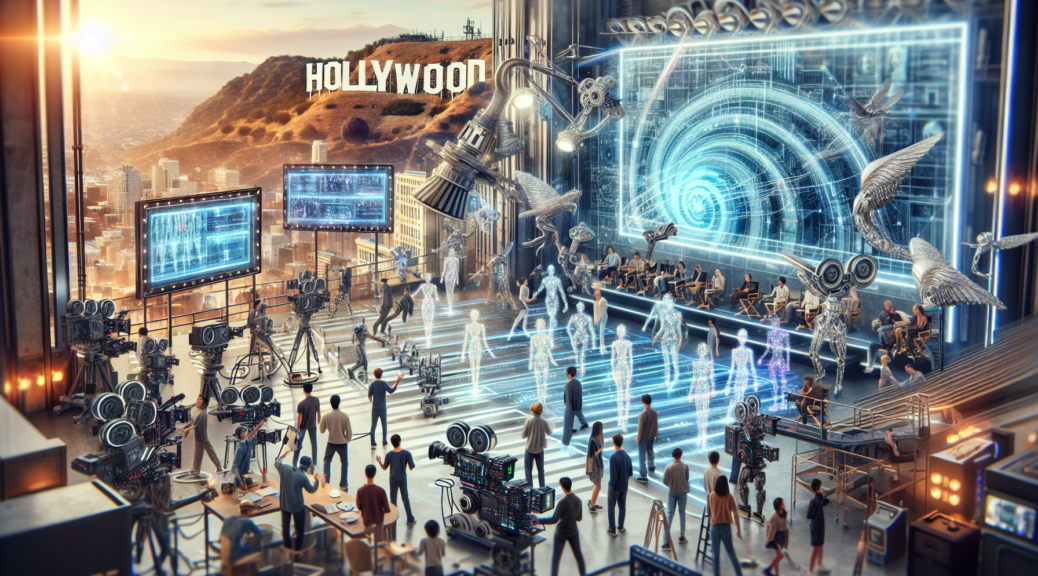
The Future of Creativity: Navigating Hollywood’s AI Influence on Human Innovation
“`html
The Future of Creativity: Navigating Hollywood’s AI Influence on Human Innovation
As artificial intelligence (AI) continues its rapid evolution, its impact on various industries becomes increasingly profound. Hollywood is no exception. The entertainment industry, known for its creativity and innovation, is at a crossroads where human artistry meets AI-driven technology. This fusion of talent and technology heralds a new chapter in storytelling and creativity, but it also raises key questions about where human imagination fits in this digital era.
The Rise of AI in Hollywood
In recent years, AI technology has advanced to an extent where its applications in film and media are not just possible, but practical and cost-effective. AI algorithms can analyze scripts, suggest plot developments, and even assist in editing films, all aimed at optimizing the production process.
AI’s Role in Pre-production
During the initial phases of filmmaking, AI plays a crucial role. By analyzing data from previous hits and audience preferences, AI can assist in crafting stories that are more likely to succeed at the box office. Some of the key applications in this phase include:
- Script analysis: AI tools can predict which elements of a script will resonate with audiences.
- Casting recommendations: Algorithms can analyze actors’ past performances to suggest casting options that align best with the script.
AI’s Influence in Production and Post-production
AI technologies extend their influence to production and post-production suites, where they can reshape footage through advanced editing tools, enhance special effects, and refine sound design. This integration helps in:
- Automated editing: AI can handle time-consuming editing tasks, such as sorting through raw footage to select the best takes.
- Visual effects (VFX) augmentation: AI-driven VFX tools can create more realistic and immersive environments.
Challenges to Human Creativity
While AI offers numerous advantages, its rise ushers in a spectrum of challenges for human creativity. A crucial concern is that reliance on AI could gradually erode the uniquely human aspects of creativity. Here are some vital challenges facing artists and creators:
Homogenization of Content
AI’s reliance on data and patterns might lead to a homogenization of creative content. By analyzing what has worked in the past, AI tends to encourage filmmakers to replicate successful formulas, potentially stifling innovation.
Creative Ownership
The question of who truly owns a piece of art generated with substantial AI input presents ethical dilemmas. Traditional notions of authorship are complicated, prompting a reevaluation of intellectual property laws.
Cinematic Originality
AI might also produce content that lacks originality. By defining parameters for success, AI tools could potentially inhibit creativity’s more unbounded and unexpected qualities, which are essential for groundbreaking art.
Balancing Innovation with Tradition
To navigate this seismic shift in the film industry, balancing AI technologies with traditional human creativity is crucial. Embracing this new technological landscape doesn’t necessarily mean abandoning the past. Instead, it calls for a strategic integration of new tools with traditional storytelling techniques.
Empowering Artists
AI should be viewed as a tool to empower, not replace, creators. By offloading the more routine and technical aspects of filmmaking, AI can provide writers and directors with more time and resources to focus on innovative storytelling.
Nurturing Creativity
Educational programs and workshops can equip artists with the skills to harness AI technologies effectively, fostering an ecosystem where technology amplifies the artistic process rather than diminishes it.
The Human Touch in AI-Dominated Spaces
Despite AI’s meteoric rise, the essence of storytelling remains inherently human. The ability to evoke emotions, explore philosophical questions, and reflect on the human condition is something machines cannot replicate. This reality underscores the necessity of maintaining the human touch in the creative process.
Human-AI Collaboration
Embracing a collaborative approach where human intuition and AI capabilities complement each other paves the way for more exciting and diverse content. Creators can utilize AI for technical efficiency while infusing projects with distinctly human perspectives and emotions.
A Vision for the Future
The future of creativity in Hollywood lies in the synergy between human ingenuity and AI innovation. Instead of viewing AI as a threat, the industry can harness it as a potent tool to push boundaries and explore new artistic frontiers. The key is to ensure that technology serves as an enhancer of creativity, keeping the door open for stories that resonate on a deeply human level.
As Hollywood continues to evolve in the face of AI advancements, the power of human creativity remains steadfast. By acknowledging the potential of AI and human collaboration, the entertainment industry can journey towards a future where storytelling becomes more diverse, immersive, and transformative than ever before.
“`



